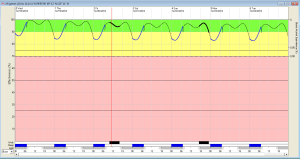The life of a professional referee in the NHL, NBA or world premiere soccer may sound glamorous and fun (the travel! the games!) but the reality is, their schedules can be even more demanding than those of the athletes themselves and may contribute to game refereeing errors and stress.
In 2008 Mike Leggo wrote about a week in the life of an NHL referee. On day one, he leaves his home on the West Coast for a next day game in Washington. “The trip is a demanding four games in five days,” he says, “encompassing Washington, Montreal, Philadelphia, and Columbus…Six nights, seven flights, two countries, thousands of air miles…all in a week in the life of an NHL referee”.
Hockeybuzz.com blog recently interviewed NHL referee, Paul Devorski: “There’s actually quite a bit of travel,” Paul confirms, “It’s hard to do, but they try to travel you around so you get to see every team X amount of times, so that keeps you busy. Our road trips are anywhere from a week to 10 days.” He enjoys the actual experience of game officiating, but admits “Honesty, the travel gets wear and tear on you.”
Fatiguing schedules aren’t just a problem for referees in the NHL. The NBA’s Pat Fraher told RefereeMindset.com that the life of an NBA ref is busy: “Travel is hectic…a different city every 2 days for about 25 days a month.” Last year Dallas Maverick’s owner, Mark Cuban, pointed out that the “stressful travel schedule of the condensed season” might have contributed to the “poor quality of officiating”. And in UK Premiership soccer, West Ham United manager, Sam Allardyce, stressed that their “referees are travelling all over the country and out in Europe” for the duration of their seasons. He has famously blamed referee fatigue for decision errors during games, “Fatigue is everything in terms of decision making,” he said back in December, “Once it kicks in you lose the ability to make those decisions correctly…They need to ease the load on the referees we have.”
Professional sport teams are starting to take a more analytical look at the ways that training and travel schedules affect their athletes’ fatigue and game time effectiveness, but who is addressing those of the referees when the wrong call can make the difference in a team’s league standing?
Our own Pat Byrne recently spoke to Vancouver’s Team 1040 radio about fatigue management and professional sports, acknowledging the frustrations that team management and players must face when the wrong calls change their game momentum, “You’re doing all the training, you’re doing all the coaching, you’re doing everything you possibly can and then you get a tired official making a dumb mistake…you miss a hand ball, you miss a penalty and you lose a game….It’s fixable” he says.
